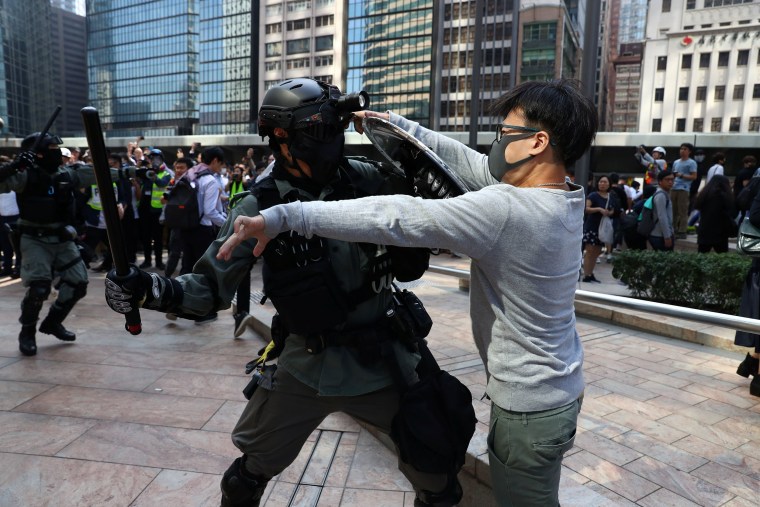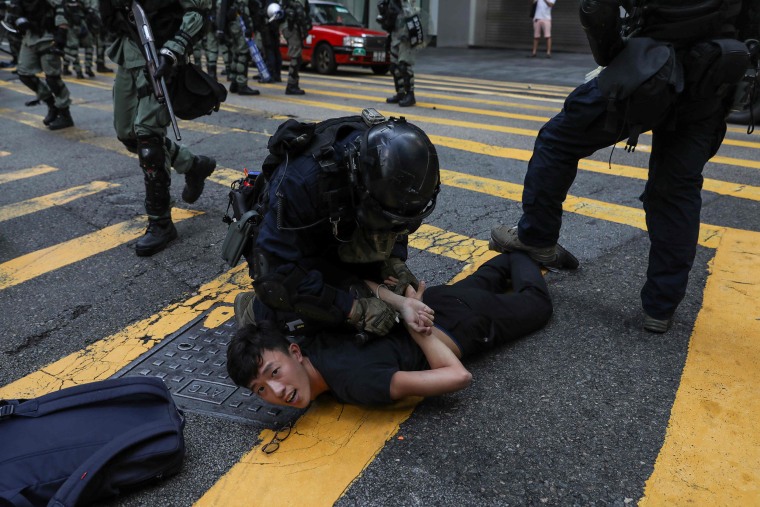Hong Kong's demonstrations brought unprecedented violence to the former British colony this week, as protesters doused a man in gasoline and set him alight and clashes between police and protesters paralyzed the city's transportation networks, closing universities and businesses.
Authorities have adopted an increasingly strident tone in response to the months of unrest, also telling the United States to back off criticizing Beijing's handling of the crisis.
"We urge the U.S. to clearly assess the situation and pull back before it's too late," Chinese Foreign Ministry spokesperson Geng Shuang told a briefing after the State Department urged Beijing to keep its promises on Hong Kong's rights. "The U.S. side must immediately stop pushing the relevant bills, stop supporting violent offenses, and stop using Hong Kong to interfere in China's domestic affairs."
The House of Representatives passed a bill in October supporting the protesters. This must go to a vote by the Senate before it can be sent to President Donald Trump.

Though the protests have entered their sixth month, this week's clashes have reached a new level.
"It's sinking into the mire even more deeply and the levels of violence are continuing to escalate on both sides," Charles Parton, a former British diplomat with years of experience in China, said. "It's more of the same — but far worse."
Officers have fired tear gas and fired rubber bullets, arresting hundreds of the demonstrators this week alone.
On Monday, a police officer shot a demonstrator in the chest at close range, and protesters doused a man in gasoline and set him alight. Both were being treated in hospital, authorities said.
On Tuesday, police that "the violence has reached a deadly level" and that the city is on the "brink of total breakdown."
Hong Kong's leader Carrie Lam has branded the demonstrators "enemies" of the people. China's Liaison Office in Hong Kong accused them of "blatant terrorism," according to Chinese state media.
Wednesday was the third day that hundreds of protesters have effectively shut down the city's main business district. All schools were closed for the day and some demonstrators were camped at barricades on university campuses after a night of clashes with police.
Riot police tried to disperse the crowds near the stock exchange, wrestling some people to the ground and beating others with batons. The mask-wearing anti-government protesters have been throwing bricks, Molotov cocktails and even using bows and arrows during the pitched battles in the streets.
They are angry at police brutality and perceived meddling from China, which controls Hong Kong but is supposed to allow it certain democratic and economic freedoms.
The windows of fashion store Georgio Armani were scrawled with the words, "It's now 1989 4th June," a reference to the crackdown by Chinese troops on pro-democracy protesters in Beijing's Tiananmen Square, Reuters reported Wednesday.
The clashes have spread to university campuses, with demonstrators and police battling through Tuesday night and returning to their barricades as day broke.

"There has been a clear shift over the last few days with a major escalation in protests and violence," said Tim Summers, a lecturer at the Chinese University of Hong Kong, one of those embroiled in the clashes. "The police have attempted a tough response. There is currently no end in sight."
Parton, the former diplomat who is now a senior associate fellow at the Royal United Services institute think tank in London, agrees it's difficult to see a way forward.
"The Communist Party of China has got its intentions, and I think they're pretty clear. The Hong Kong people have their system of values and their way of life. So where is it possible to say to yourself that there's a way out of this?" he said.
Demonstrations were initially against a proposed law that would allow criminals to be extradited to China, something the protesters feared would be used to draw people into Beijing's legal system.
But they have since expanded to cover a range of issues, from police brutality and democratic reforms to the sky-high prices of apartment rentals in the city.
Hong Kong was a British colony but was given back to China in 1997 under the "one country, two systems" policy. This meant that although Hong Kong is part of China, it would enjoy other democratic and economic freedoms not afforded to the rest of the mainland.
China denies interfering in Hong Kong and has blamed Western countries, including Britain and the United States, for stirring up trouble.
